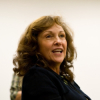Ann Druyan

Ann Druyan
Ann Druyanis an Emmy Award-winning American writer and Peabody Award-winning producer specializing in the communication of science. She co-wrote the 1980 PBS documentary series Cosmos, hosted by Carl Sagan, whom she married in 1981. She is the creator, producer, and writer of the 2013 sequel, Cosmos: A Spacetime Odyssey...
ProfessionTV Producer
Date of Birth13 June 1949
CityNew York City, NY
grandeur universe
The Universe revealed by science is one of far more awesome grandeur than any religion has ever posited.
military mass-destruction world
Carl took on the military-industrial complex. He campaigned around the world for an end to the production of weapons of mass destruction. To him it was a perversion of science.
deception deny gratification
The only gratification that science denies to us is deception.
science views revision
Science reserves the highest reward for those of you who disprove our most cherished beliefs. At any moment someone from any walk of life could come forward and be responsible for a complete revision of our view of everything.
Science is nothing more than a neverending search for the truth.
giving-up passion thinking
People think that if you are a scientist you have to give up that joy of discovery, that passion, that sense of the great romance of life. I say thats completely opposite of the truth.
death husband ideas
The way he treated me & the way I treated him, the way we took care of each other & our family, while he lived. That is so much more important than the idea I will see him someday.
believe atheism want
Carl did not want to believe. He wanted to know.
believe atheism want
Interviewer: "Didn't [Sagan] want to believe?" Druyan: "He didn't want to believe. He wanted to know.
taken eye feel-better
Contrary to the fantasies of the fundamentalists, there was no deathbed conversion, no last minute refuge taken in a comforting vision of a heaven or an afterlife. For Carl, what mattered most was what was true, not merely what would make us feel better. Even at this moment when anyone would be forgiven for turning away from the reality of our situation, Carl was unflinching. As we looked deeply into each other's eyes, it was with a shared conviction that our wondrous life together was ending forever.
loneliness intelligent cosmos
We may be living at that moment, on the cusp, when we go from being a species that feels a kind of loneliness in the cosmos to actually one sometime in the not too distant future being able to confirm the existence of other intelligent life.
technology thinking views
I've been thinking about the distorted view of science that prevails in our culture. I've been wondering about this, because our civilization is completely dependent on science and high technology, yet most of us are alienated from science.
believe ideas long
I believe that we are a story-driven species and that we understand how things are put together, in the context of narrative. It's a shame that science hasn't been taught that way, in a long time. It's usually the fact completely devoid of any human experience or any idea of how the scientist came to that conclusion.
wise thinking choices
The aspirations of democracy are based on the notion of an informed citizenry, capable of making wise decisions. The choices we are asked to make become increasingly complex. They require the longer-term thinking and greater tolerance for ambiguity that science fosters. The new economy is predicated on a continuous pipeline of scientific and technological innovation. It can not exist without workers and consumers who are mathematically and scientifically literate.